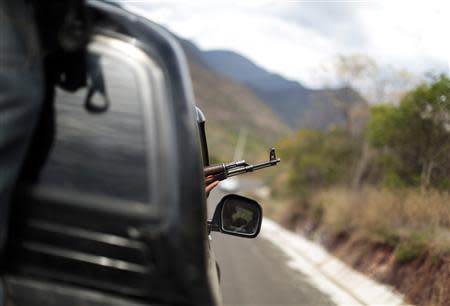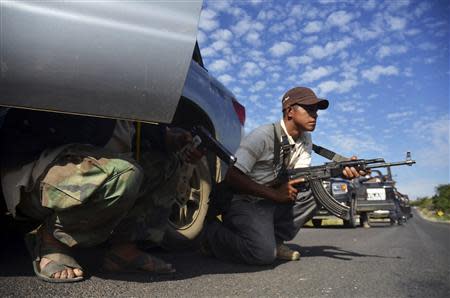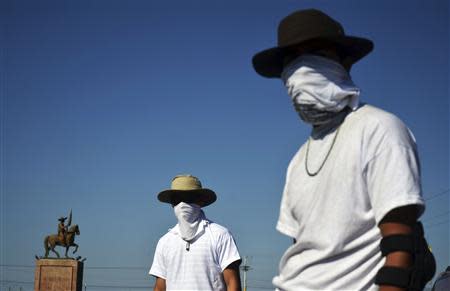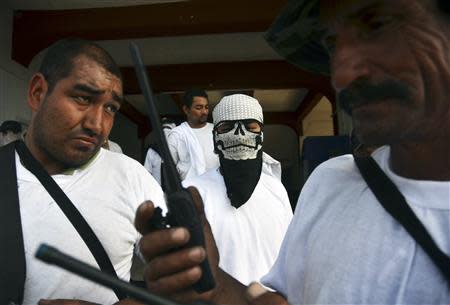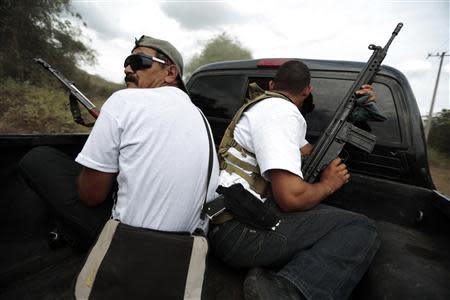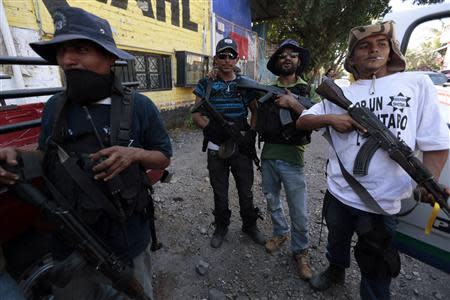Vigilantes vs. narcos: a security threat in Mexico badlands
By Simon Gardner BUENAVISTA, Mexico (Reuters) - Clutching shotguns, rifles and battered submachine guns, dozens of vigilantes prepare to head out on patrol in this rugged corner of restive western Mexico, where they are at war with a drug cartel. The motley crew of renegades organize themselves into a neat line of pick-ups and luxury SUVs by the side of the road in the hamlet of Buenavista. Moments later, an armored convoy of federal police passes by. The two groups eye each other, a couple of vigilantes wave, and then each go about their business unimpeded. In violence-racked Michoacan, an impoverished agricultural state about 1-1/2 times the size of Switzerland, vigilantes are battling a cartel called the Caballeros Templarios, or Knights Templar, for control of swathes of the failing state. After letting the conflict brew, the government this month vowed to assert control but its messages have been contradictory. First it said it helped protect a vigilante leader because he was hurting the cartel, then days later it called on his group to disarm. It sent troops to seize their weapons, but immediately backed off after two civilians were killed in an early clash. Since then, the security forces have turned a blind eye to the vigilantes' movements, seeing them as a much lesser evil and possibly a useful ally against the Knights Templar. Still, experts say the vigilantes' advance in this land of valleys where avocado and lime grow and mountains peppered with meth labs and marijuana fields risks creating a security quagmire for President Enrique Pena Nieto. "The bad guys are killing people, that's why we're taking up arms," said Fidel, the 37-year-old lime farmer turned vigilante, refusing to reveal his surname for fear of reprisal from the Knights Templar, a cult-like group that styles itself after caped medieval crusaders. "We're doing the government's work for them," he added as another vigilante proudly showed off a mother of pearl handle a local artisan made for his revolver. For now, the vigilantes have the Knights on the run. They have taken over the abandoned, luxurious lairs of drug bosses, posting gunmen to fend off any Knights tempted to return. In one, hidden behind a warehouse facade, lay precious clues to the workings of organized crime: a radio scanner, check book stubs and ledgers detailing payments running into tens of thousands of dollars. No police had entered. So close is the cooperation that some vigilante leaders even have police bodyguards, and their ranks man sandbag roadblocks as federal troops roll by. "The strategy is about not clashing (with vigilantes), avoiding confrontation, and putting human life and dialogue at the fore," said Alfredo Castillo, appointed federal government commissioner for Michoacan in a purge of state security officials. "We are talking about neutralizing (the Knights') ability to operate, organize, recruit, finance itself and generate violence. That is what is really important." The Knights Templar cast themselves as a moral authority who defend the people, and have set out a strict set of codes in a small book emblazoned with red crosses and images of knights in armor. Some cartel leaders have even had portraits done of themselves dressed as knights. One bizarre slogan, visible beneath the paint defacing it on a roadside shrine to the Knights Templar, reads: "Power without justice only generates violence." The Knights have dangled the corpses of murdered rivals from bridges and kidnapped and "disappeared" those who refused to pay protection money, local residents say. The government says they have also ambushed and murdered soldiers. DEFIANCE The vigilantes, or self-defense groups, say they won't lay down arms until the government kills or captures the cartel's leaders, who they say stole property and demand a 20 percent share of local farmers' sales as protection. "They charge a cut from everyone," said mango producer Lucio Palomino Casillas, 45, as he watched vigilantes patrol one side of the street in the former Knights Templar stronghold of Nueva Italia. A federal police convoy drove by the other way. "I'd rather be shot dead than have to live like this." During his 14 months in office, Pena Nieto has sought to focus public attention on his wide-ranging efforts to reform Mexico's economy and away from the grisly violence that has killed more than 80,000 people since his predecessor, Felipe Calderon, launched a military offensive against drug cartels seven years ago. Asked about the situation in Michoacan, Pena Nieto said last week that some of the vigilantes "have genuinely organized to defend themselves from the incursion of organized crime". Nik Steinberg, a Latin America expert at Human Rights Watch, says the government has delivered "a totally schizophrenic message" by working side by side with the vigilantes while telling them to lay down arms. "The consequence of that mixed message is that the groups feel legitimized and feel entitled to carry out duties that should be reserved for the state," he said, adding that the events in Michoacan could lead to vigilante groups sprouting up elsewhere across Mexico. The Knights grew out of a gang in Michoacan known as La Familia, a quasi-religious group that waged a local war against the Zetas, the most notorious cartel in Mexico. The Familia themselves started out much like the vigilantes when they took up arms. "La Familia received the backing of society," Michoacan commissioner Castillo said earlier this month. "They didn't see La Familia as a criminal group but as guys who'd been recruited because of a lack of support (from the state government)." The risk in Michoacan is that history repeats itself, with one new violent group replacing the old. Experts say using local militias is a bad idea because they often end up behaving like those they were set up to fight, and some locals claim the new groups of vigilantes have been infiltrated by rival drug gangs. The U.S. government is watching Michoacan, with Secretary of State John Kerry saying he was "concerned" by events. RECIPE FOR DISASTER? Castillo says the government has identified 26 top Knights and a further 100 lieutenants as targets. It has rolled out 4,800 federal police and 4,500 troops in Michoacan, but so far has caught none of the leaders, citing complicated terrain. Pena Nieto has vowed not just to bring peace to Michoacan but also tackle the root causes of the lawlessness. The government has proposed eventually incorporating some of the vigilantes into a rural police force and giving them formal training, in tandem with job-creating development programs. Guillermo Anaya, an opposition lawmaker who heads the public security committee in the lower house of Congress, says the government's handling of Michoacan risks undermining the impact of reforms passed by Pena Nieto to lift the economy. "It is the acid test for this government," Anaya said. "They should have decreed it a failed state." After years of sluggish growth, the government is betting on an economic revival to generate opportunities that will undermine the allure of organized crime. And some top economists are upbeat on the country's prospects despite the violence. "I think (security) is a bit of a lagging indicator," former Goldman Sachs economist Jim O'Neill said in a telephone interview. "I think it's much more sensible to focus on implementing the wealth-creating reforms." Among those hoping for a better life is mother-of-two Lisbeth Sosa, 24, who watched nervously as troops guarded the mayor's office in the Knights' nerve center of Apatzingan. Looking fearful as she served coffees on the main square in a city long in the Knights' clutches, she frets for her children's safety after a steady stream of killings. "My four-year-old son asks me: Mummy, if I don't behave, will they kill me?" said Sosa, who smuggled herself into the United States eight years ago, before separating from her husband and returning last year. It is a decision she now regrets. "The only solution is to get the Knights out of here, but I don't think they'll ever manage it. They have roots here." (Additional reporting by Dave Graham and Chrissie Murray in Mexico City and Lesley Wroughton in Washington; Editing by Kieran Murray)

